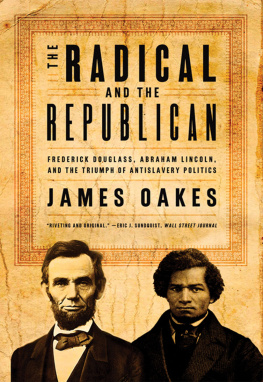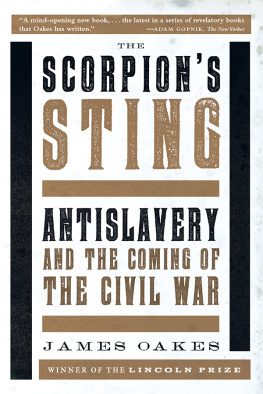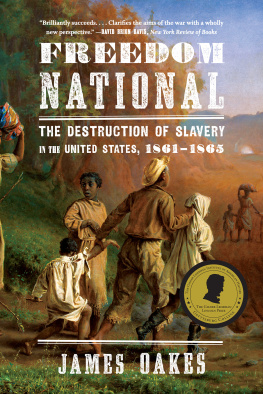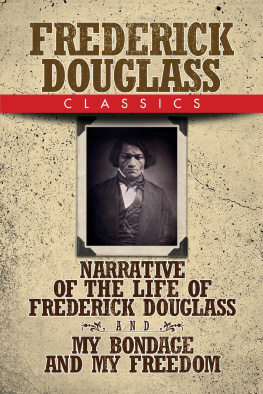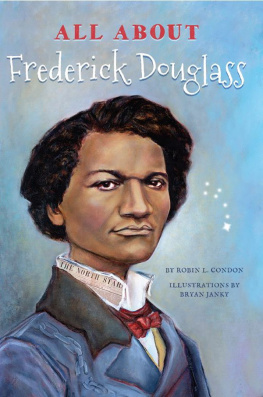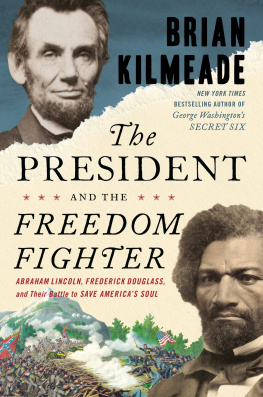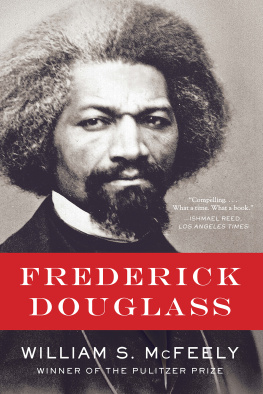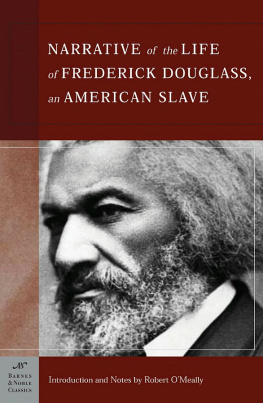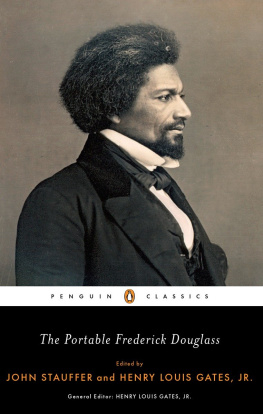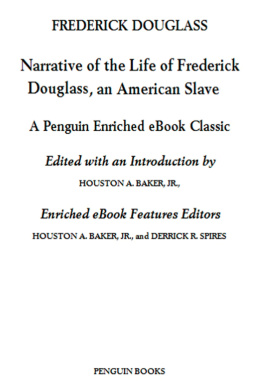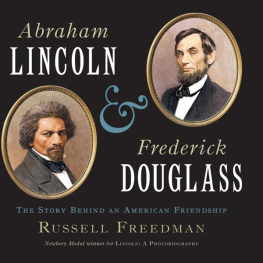Further praise for The Radical and the Republican
[A] fine new account of Lincolns friendship with Frederick Douglass.
Adam Gopnik, The New Yorker
Extremely insightful. The Radical and the Republican should be read by all people who wish to understand reform and the nature of change in the Civil War era and the two men who played such indispensable roles in emancipating not only the slaves but much of the country from the scourge of slavery.
Phillip Shaw Paludan, Civil War Book Review
An eye-opening and absorbing account of the relationship between Lincoln and Douglass.
Chuck Leddy, Christian Science Monitor
Studded with telling quotes from both men and comes to conclusions that are often really far reaching.
Michael P. Riccards, Washington Times
Compelling. A fresh and fascinating look at the lives of these two pivotal players during the Civil War. This book makes a substantial and singular contribution to the literature. The author has taken a complicated tale and made it understandable and accessible to the reader without being patronizing.
James A. Percoco, Civil War News
A sharp analysis by Oakes of how Lincoln the politician and Douglass the reformer worked, separately and together, to abolish slavery in America. Oakess narrative focuses on the fascinating symbiosis between these two highly public menbut its also a brilliant meditation on the timeless, crucial roles played by the radical and the politician to resolve any public issue.
Kirkus Reviews
Oakes brilliantly follows the choreography by which Lincoln and Douglass, both uncommonly intelligent, moved from a position of mutual incomprehension to one of mutual admiration and respect, one great man taking the measure of another great man.
Garry Wills, author of Lincoln at Gettysburg
James Oakes has an uncanny feel for how American politics actually worked in the Civil War era. His beautifully carved gem of a book rescues Abraham Lincoln and Frederick Douglass from the smugness of posterityand forcefully explains how radicalism and mainstream party politics converged to overthrow American slavery.
Sean Wilentz, Princeton University, author of The Rise of American Democracy: Jefferson to Lincoln
James Oakes absorbing story of two familiar American heroesFrederick Douglass and Abraham Lincolnresonates with new perceptions and insights. This is a great American tale told with a deft historical eye, painstaking analysis and a supple clarity of writing. The Radical and the Republican is a significant book that should be read by all Americans.
Jean H. Baker, author of Mary Todd Lincoln: A Biography
Here they are, with equal billing, two of Americas master politicians, Frederick Douglass and Abraham Lincoln. They made history back in those quaint days when, occasionally, politicians acted with both character and courage. James Oakes has given us a bracing book.
William S. McFeely, author of Frederick Douglass
THE RADICAL AND THE REPUBLICAN
A LSO BY J AMES O AKES
Slavery and Freedom:
An Interpretation of the Old South
The Ruling Race:
A History of American Slaveholders
THE RADICAL AND THE REPUBLICAN
F REDERICK D OUGLASS, A BRAHAM L INCOLN, AND THE T RIUMPH OF A NTISLAVERY P OLITICS
James Oakes
W. W. Norton & Company
New York London

Copyright 2007 by James Oakes
All rights reserved
First published as a Norton paperback 2008
For information about permission to reproduce selections from this book, write to Permissions, W.W. Norton & Company, Inc., 500 Fifth Avenue,
New York, NY 10110
Library of Congress Cataloging-in-Publication Data
Oakes, James.
The radical and the Republican: Frederick Douglass, Abraham Lincoln, and the triumph of antislavery politics / James Oakes.1st ed.
p. cm.
Includes bibliographical references.
ISBN: 978-0-393-07872-5
1. Douglass, Frederick, 18181895. 2. Lincoln, Abraham, 18091865. 3. African American abolitionistsBiography. 4. PresidentsUnited StatesBiography. 5. SlaveryPolitical aspectsUnited StatesHistory19th century. 6. Antislavery movementsUnited StatesHistory19th century. 7. United StatesPolitics and government18611865. 8. United StatesPolitics and government18571861. 9. United StatesRace relationsHistory19th century. 10. FriendshipUnited StatesCase studies. I. Title.
E449.D75015 2007
973.7'1140922dc22 2006032215
W.W. Norton & Company, Inc.
500 Fifth Avenue, New York, N.Y. 10110
www.wwnorton.com
W.W. Norton & Company Ltd.
Castle House, 75/76 Wells Street, London W1T 3QT
For our son,
D ANIEL A GUSTN O AKES
CONTENTS
ABBREVIATIONS
CW | Roy P. Basler, ed., The Collected Works of Abraham Lincoln (New Brunswick, N.J., 1953) |
FDP | John W. Blassingame, John R. McKivigan, and Peter Hinks, eds., The Frederick Douglass Papers (New Haven, 1979) |
HI | Douglas L. Wilson and Rodney O. Davis, eds., Herndons Informants: Letters, Interviews, and Statements about Abraham Lincoln (Urbana and Chicago, 1998). |
Life & Writings | Philip S. Foner, ed., The Life and Writings of Frederick Douglass (New York, 1950) |
RW | Don E. Fehrenbacher and Virginia Fehrenbacher, compilers and eds., Recollected Words of Abraham Lincoln (Stanford, Calif., 1996) |
INTRODUCTION
The press reports were vicious. Lincoln had spoken recently in Springfield and on June 15, 1856, a leading Democratic Party newspaper, the Illinois State Register , denounced his speech as niggerism. Lincoln had said nothing he had not said many times before. If anything the speech was already familiar to his listeners. Since the founding days of the Republic Congress had exercised the power to restrict slaverys expansion, Lincoln argued, and Congress should continue to do sofor the simple reason that slavery was wrong. But the Democrats, led by Illinois Senator Stephen A. Douglas, had no such moral qualms; they were content to allow the territories to decide for themselves whether or not to legalize slavery.
Lincolns claim that slavery should be restricted because slavery was wrong struck Democrats as a flagrant appeal to radicalism. It was black abolitionist propaganda, the Register cried, adding that Lincolns speech has as dark a hue as that of Garrison or Fred Douglass.
Frederick Douglass. It was enough for the Register to print the name with no further identification. Everyone knew who he was: an escaped slave, an infamous abolitionist, easily the most prominent black man in the United States. It was not the last time Illinois Democrats would fasten that name around Lincolns neck.
Stephen Douglas did it all the time during his famous debates with Lincoln in 1858. In their second encounter, at Freeport in late August, Douglas the senator claimed that Douglass the abolitionist was one of Lincolns closest advisers. When the crowd hooted at this, the senator pressed his point further. He claimed that on a previous visit to Freeport he had seen Frederick Douglass himself seated in a magnificent carriage and accompanied by two white women, a mother and her daughter, all of them being driven by another white man.
What of it? someone in the crowd shouted.
All I have to say of it is this, Senator Douglas answered, that if you, Black Republicans, think that the negro ought to be on a social equality with your wives and daughters, and ride in a carriage with your wife, whilst you drive the team, you have a perfect right to do so. Senator Douglas then passed along a rumor to the effect that one of Fred. Douglass kinsmen, another rich black negro, is now traveling in this part of the State making speeches for his friend Lincoln as the champion of black men. For an accomplished race-baiter like Stephen Douglas, there was no more effective weapon than linking his opponent with the name of Frederick Douglass.

